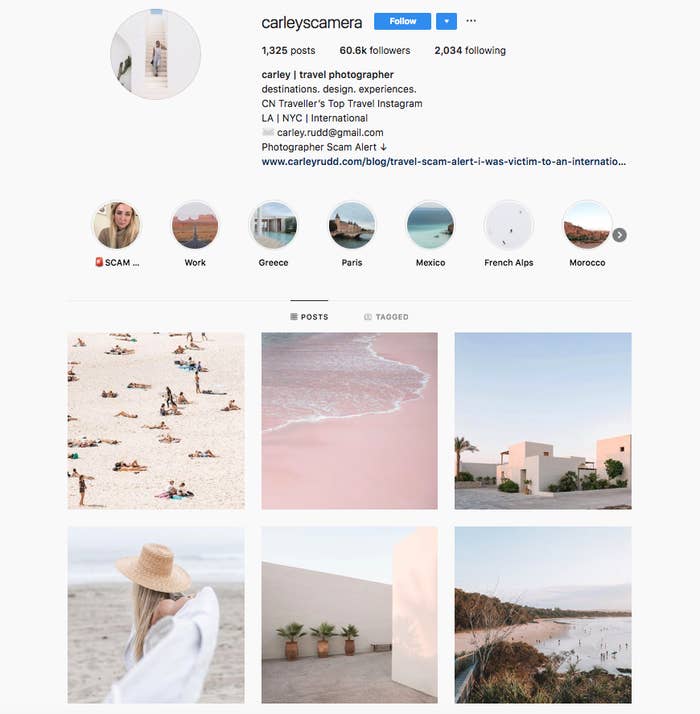
Multiple people — a majority of them freelance photographers with significant Instagram and social media followings — are alleging they were pulled into an intricate scam by someone pretending to be Wendi Deng Murdoch. They say this scammer sent them flying to Indonesia and other parts of Southeast Asia under the pretense of an exclusive photo assignment, but it was all a hoax.
The victims said they were coerced into paying the imposter various sums of money up front, including for their own flights. Then, the mysterious person impersonating the Chinese American businessperson would disappear, leaving their victims stranded in Southeast Asia.
K2 Intelligence, an investigations and cyber defense firm, told BuzzFeed News it is working closely with “the highest levels of law enforcement” in the US to zero in on a suspect in the case. They believe this person has been puppeteering elaborate schemes on those working in public-facing, creative industries for years. Instagram influencers are just their latest target, it said.
According to a 2018 report by the Hollywood Reporter, acclaimed producers who were impersonated in a similar scam hired the help of K2 Intelligence to investigate those cases. K2 Intelligence told BuzzFeed News it believes these scams are related.
The FBI and the NYPD are also involved in the case, according to the Hollywood Reporter, but neither immediately returned a request for comment.
Multiple victims who spoke to BuzzFeed News gave a chronology of very similar events. They received an email from a person purporting to be Murdoch, offering them a job to photograph local areas of Southeast Asia for a photo exhibit she was putting together around the Beijing Winter Olympics. A representative for Murdoch did not immediately respond to a request for comment.
The victims all spoke on the phone with the scammer and her supposed assistant to coordinate details. The person explained her finances had been tied up and asked photographers to pay for their own flights, promising reimbursements.
Upon arriving in Southeast Asia, more unforeseen events arose, prompting photographers to pay the person and those working for her various sums of money. Within a day or two, the person pretending to be Murdoch disappeared on them.
Victims claimed they lost thousands of dollars under this ruse.
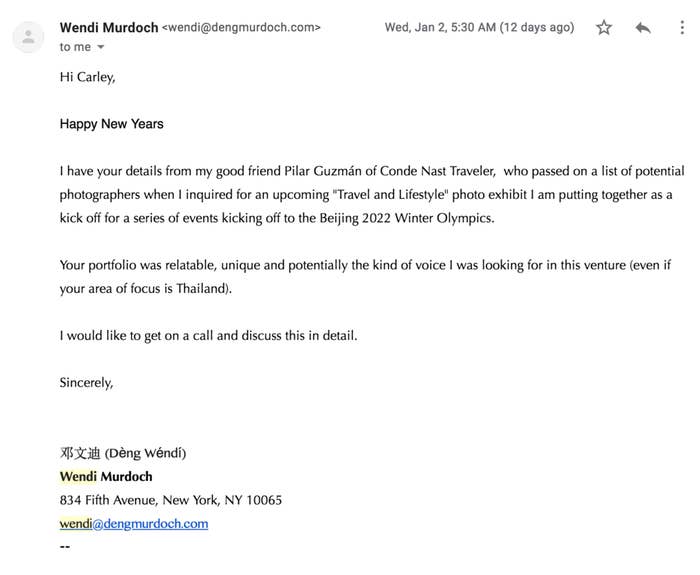

Carley Rudd, a 30-year-old photographer who called herself a “digital nomad” because of the nature of her traveling lifestyle and work, said she recalled being “super excited” by the prospect of someone of Murdoch’s status personally reaching out to her Jan. 2.
Rudd said she immediately got on the phone with the person pretending to be Murdoch and spent hours on the phone with the person, working out the terms and details of the assignment, which would send her to Jakarta, Indonesia, for only three days.
“Once I got on the phone with her to discuss the scope of work, she went into detail about how she was born in this rural part of China and she wanted to put together this heritage exhibit to bring this vision of her personal ethos in an artistic way,” said Rudd. “She told me she loved my work, she knew specific projects I’d done in the past.”
She noted the scammer even had a slight Chinese accent.
Rudd was asked to sign an NDA immediately following their conversation, before being sent an itinerary and creative brief that felt fairly “real” to her, she explained. Rudd’s husband was permitted to join her on the trip.
“Murdoch” soon connected her with someone she claimed to be her assistant, named Aaron, who became the main point person for Rudd. It’s unclear whether Aaron and “Murdoch” were the same person over the phone, which some victims believe to be the case.
Rudd said things moved fast. On Jan. 5, she and her husband were already on a flight from New York City to Jakarta. Upon arrival, she was greeted by a driver who would also prove to be unreliable and who’d disappear on them, she said.
Rudd said there were several red flags she overlooked in both negotiating the assignment and during her very brief time in Indonesia.
“I kept making excuses and thinking, like, ‘This might be how someone of her caliber does business’ and ‘somewhere like Jakarta, Indonesia, there’s a lot of corruption.’ It blurred my vision and clarity,” she said.
For one, the alleged scammer told Rudd that because “Murdoch’s” personal finances would be compromised, they asked her to pay out of pocket for her and her husband’s flights and the photo permit they needed to shoot at various local sites.
When Rudd landed, the scammer asked her to pay cash for $1,400 in additional permits they said they overlooked. The people impersonating Murdoch and her assistant “apologized profusely” to Rudd for their oversights, and promised they would reimburse her with 24 hours of receiving her invoice.
“They had an excuse for everything,” she said.
“They sent over a fake wire transfer confirmation on a Friday while I was catching my first flight ... when I arrived they kept confirming that the transfer was going through and I should see it by end-of-day Monday. And then by end-of-day Monday they said the funds would be coming in Tuesday morning. They made an excuse for it.”
As far as the $1,400 cash payment for “an expedited photography permit,” Rudd suspects that was used to quickly book the hotel she and her husband would be staying in.
Rudd said she found it “very shady” that their driver had to stop at a gas station to hand off the cash in a plastic bag to a third party. And she noted the driver “was taking a long time to get to the hotel,” which she now believes was an effort to stall for time until the third-party person used the funds to book their hotel.
“Again, I wasn’t fully thinking it was a scam. [At the time] I made an excuse that it’s Indonesia and it’s not that crazy for something like that to happen,” she said of the cash hand-off.
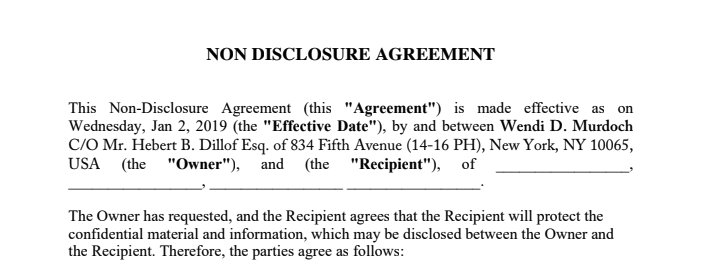
Rudd said during the time she felt “weirded out” by a series of plans that would fall through, like the assistant changing drivers on them, or asking them to take their own taxis into town last minute. She, however, was hesitant to tell friends and family about her whereabouts and about her suspicions because she was afraid of breaching the NDA.
She also noted that during phone calls with the scammer where she’d express some concern or confusion, the person on the other end would try to soothe her worries by complimenting her or her husband. During one conversation, the scammer offered jobs to Rudd’s husband, who’s a writer, and said she would “send [them] to Japan next.”
Rudd said “it all started to sink in” for her and her husband when scheduled calls from the people pretending to be Murdoch and the fake assistant were not happening by the third day. When she attempted to reach them, calls were being forwarded to an automated voicemail of someone with a British accent.
“I never heard from them again,” she said. “When we checked in with the hotel again to make sure we had our room for the next day, the front desk said no room was on record.”
It was then that they realized they were most likely being conned, and they were not going to be reimbursed for any of the sums of money they put up. “My heart was racing and my stomach sunk,” she said.
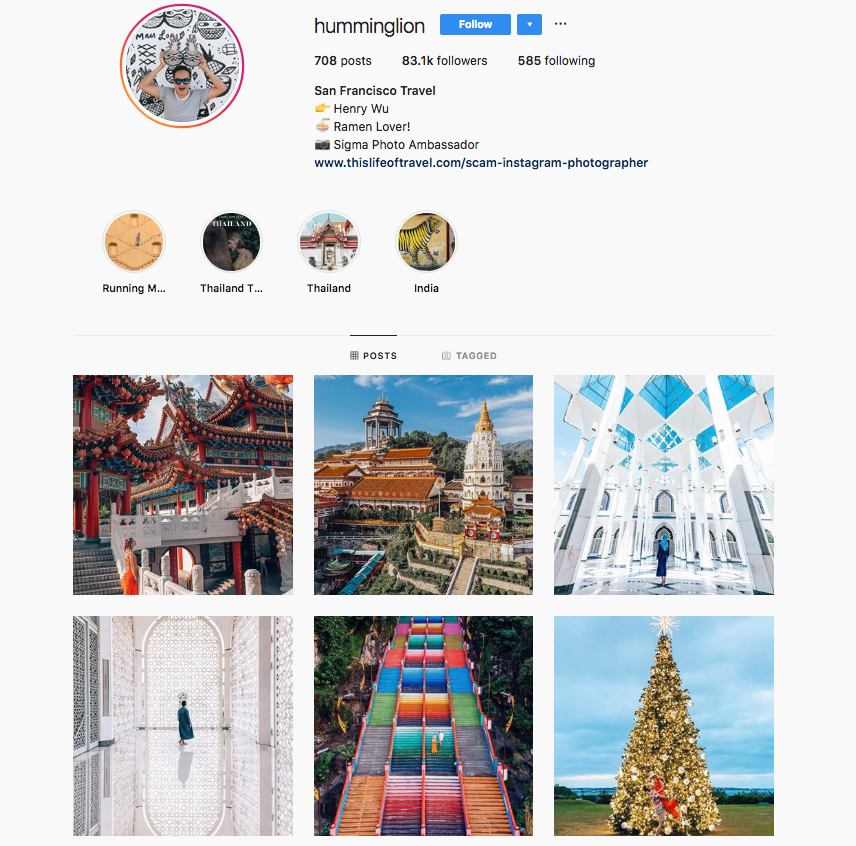
Others like Rudd shared almost identical stories. Henry Wu and Zornitsa Shahanska, a couple based in San Francisco who are both major travelers and freelance photographers, have over 80,000 followers on Instagram each.
Wu and Shahanska received the job offer from the imposter in late December, and within days they were booking flights to Jakarta, Indonesia.
Wu said it was evident from his conversations that the people pretending to be Murdoch and the assistant had done a lot of research on him and his girlfriend.
“She knew I was Taiwanese — she had all of these conversational topics about Taiwan ready to go,” he said. “That was especially tricky. She was able to fluently have a conversation about Taiwan and in detail.”
The couple paid for their own airfare, adding that “normally we don’t do things like that.”
They then dealt with a series of last-minute plan changes and “really odd” behavior from the people involved. They “figured out it was a scam” when their third day of plans and assignments were spontaneously canceled, Wu said.
In fact, the couple even ran into another photographer on an assignment there who was experiencing something similar.
That photographer, who’s based in Germany and wished to remain anonymous, told BuzzFeed News he was represented by a photography agency when the request came through. The scammer even got past them.
“Everything was so tempting...more money as expected, an exhibit in Beijing, a nice journey,” so they “trusted in it,” he said.
When he shared notes with Wu and Shahanska, they determined they were conned. He returned home and contacted German law enforcement. Wu and Shahanska said they “tried to make the best of the situation” and flew to Malaysia to take photos for their Instagrams there.
Wu provided BuzzFeed News with a recording of one of his conversations with “Aaron.”
Nicoletta Kotsianas, a director at K2 Intelligence and the lead investigator on the case, told BuzzFeed News she was already well aware of the alleged scam and scam artist when victims, like Rudd, Wu, Shahanska, and others, contacted them directly.
“We are supporting law enforcement in multiple jurisdictions at the highest levels,” she said. (When reached, the FBI National Press Office told BuzzFeed News that, per DOJ policy, the FBI cannot confirm or deny the existence of an investigation.)
She said she’s currently working with “multiple victims” who have been scammed both recently and years ago.
In July of 2018, the Hollywood Reporter first reported about an imposter taking on the identities of acclaimed movie producers and directors to bait creatives in the industry, and obtained exclusive recordings of the imposter at work manipulating their victims with a series of different voices and accents.
Victims who spoke to BuzzFeed News said the voice recordings in the Hollywood Reporter article resembled the one pretending to be Murdoch.
While Kotsianas cannot comment on the details of the active investigation, she does believe all these scams to be conducted by one person. She thinks that person is now specifically targeting people on Instagram who frequently share travel photos and who seem to have culled a significant following from them.
“I do think Instagram influencers are a particularly vulnerable group,” she said. “They don’t have formal corporate apparatus around them. They communicate and work directly with brands and people, so it’s not out of the ordinary for things to go this way. They also fly on a whim all over the world.”
She also described the victims as “less risk-averse than other people,” noting that it’s “a perfect storm of opportunity for someone who knows exactly how to manipulate people.”
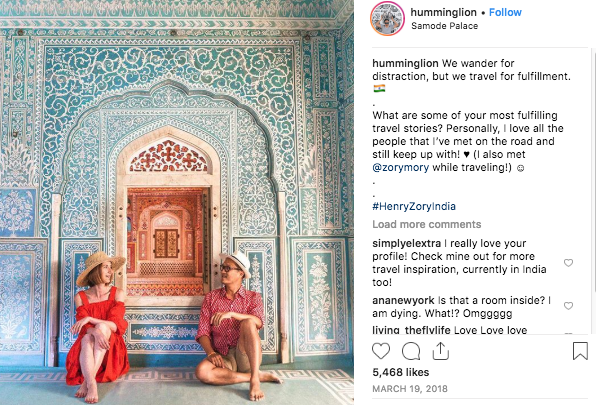
Kotsianas advises anyone who may fall into this target group to do their due diligence when receiving a job request or offer from someone notable. There are tools and things anyone can use to vet someone online.
“There are certain things [you can do,] like running a phone number through a phone validator, or, if you look at the domain that’s attached to the email address — in this case wendymurdoch.com — look up to see when it’s established, whether it’s recent, like a month ago,” she said. “Look at the metadata on an email if you look at the property of where the email is originating.”
“If Wendy Murdoch is emailing you, that’s probably not real. That’s not how this works,” she added.
Mostly, she said, all of her clients refer to a “gut feeling.” She advises to always listen to that pang of a warning signal.
Victims told BuzzFeed News they are speaking out about this to see some kind of justice in the end — and they hope that it creates more awareness so that others don’t fall victim to the scam as well.
One photographer walked away with a lesson and standard he’s holding himself to, and that he hopes others do too: “Never start a shoot without receiving up-front money.”
